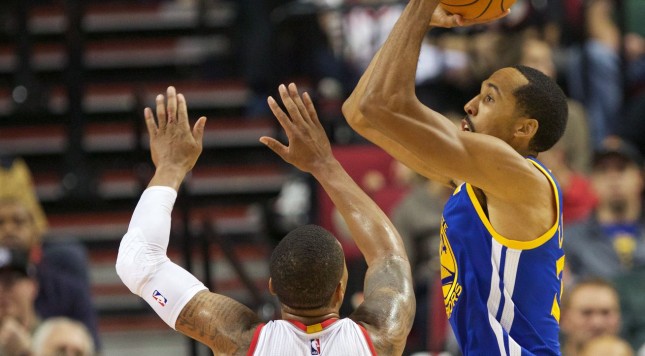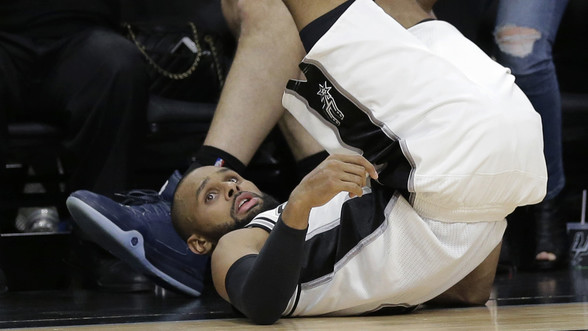Playing Portland — it could have been viewed as the easier path for the Golden State Warriors when the 2016 NBA Playoffs began.
Yes, a date with the Trail Blazers ceased to be the easier path when Chris Paul and Blake Griffin both went down, but even then, the reigning NBA champions did not figure to be pushed extremely hard by the young guns from Oregon.
The Blazers represented a feel-good story, a tale of considerable overachievement. Young pups and then-unremarkable acquisitions such as More Harkless won a playoff series against an opponent without its two foremost stars. Yet, Portland struggled to beat the undermanned Clippers in the final two games of the series. As high as the Blazers had climbed, as far as they had traveled on their NBA version of the Oregon Trail, they did not figure to be a real pain in the neck for the Warriors.
Instead, they created what just might have been the toughest, closest, most stirring 4-1 second-round series in NBA history.
Stop and consider the last time a 4-1 conference semifinal — won by the higher seed — packed as much drama, uncertainty and entertainment into its five-game box.
Stop and realize that if Portland had pulled out Game 5 in Oakland, Golden State would have carried a less-than-fully-healthy Draymond Green to the Pacific Northwest for Game 6.
Stop to contemplate the point that while Golden State consistently found a way to win games, the Warriors never fashioned a game in which they outplayed the Blazers for a majority of four quarters.
Golden State crushed Portland in the first quarter of Game 1, the last quarter of Game 2, and the third quarter of Game 4. Portland either outplayed or drew even with the Warriors in at least half the quarters of each game. In terms of minutes, Portland won more of them. The Warriors, of course, can slap a 13-3 run on opponents in two-minute spans, eliminating the previous 10 minutes of sloppiness and odd lineup combinations.
Portland put Golden State through a rougher-than-expected series, all because its role players shot the three better than anyone had a right to expect.
The emergence of Al-Farouq Aminu as a three-point threat — coach Terry Stotts finally learned how to teach him to shoot, the key point being the footwork before the catch — unlocked so much of the Blazers’ potential. Their offense operated in more space. The Warriors paid a price whenever they cheated off Aminu. With Harkless and Allen Crabbe joining the shooting gallery, the Blazers fielded ample three-point options with various lineup combinations.
Golden State needed every last ounce of Stephen Curry’s excellence… and Klay Thompson’s marksmanship… and Draymond Green’s three-point shooting… plus a dose of Shaun Livingston mid-range mastery… to survive the Blazers.
The Warriors were constantly bothered by the Blazers, but now, as the scene shifts to the Western Conference Finals against the Oklahoma City Thunder, what was an annoyance could become the Dubs’ biggest blessing.
Patty Mills, Danny Green, Tony Parker, and even Kawhi Leonard — in short, all of the San Antonio Spurs entrusted with jump-shooting responsibilities — couldn’t make nearly as many shots as they needed to against the Oklahoma City Thunder. When the Spurs failed to hit jump shots with the consistency the moment required, Oklahoma City was able to go big with its paint-packing lineup. The Thunder and Billy Donovan were able to make the fundamental alteration to their core rotation which ultimately won the series.
Keep this in mind about the Spurs’ jumpers and Oklahoma City’s successful lineups: Not only was OKC able to get away with the bigger lineup when the Spurs failed to make shots; the other half of the equation is that while the Thunder were able to force the Spurs to beat them in a certain way, OKC also had the big bodies suited to grab all the rebounds from all the Spurs’ misses.
That’s the two-way reality of rebounds at any level of basketball: They’re important to a certain degree, but if a team makes shots, rebounds cease to exist, and thereby become less important.
Portland was such a tough opponent for Golden State partly because the avalanche of made three-pointers forced Golden State’s offense to keep pace, but the other half of that story is that when the ball went through the basket all the time, the Warriors weren’t able to run the floor as much in transition.
Such is the layered nature of both shooting and rebounding: Both qualities own a certain degree of inherent value, but their value extends far beyond the attainment of three points or the securing of a possession. Making a shot or gathering a rebound help one team, but they simultaneously harm the opponent’s ability to establish what it wants. One advantage is secured here, and one disadvantage is created for the opponent there.
With all this as prelude, it’s easy to see why Portland could become the best thing to happen to the Warriors, the best opponent which could have prepared them for this Western Conference Finals series against the Oklahoma City Thunder.
*
Very simply, Golden State was already challenged to cover every last inch of the floor against Portland’s flotilla of three-point threats. Oklahoma City will have a hard time matching that standard of performance, and that attached ability to space the floor the way the Blazers could against the Warriors.
Just as simply, Golden State has the army of role-player jump shooters — not to mention star-player jump shooters — which will provide such a different defensive challenge for Oklahoma City relative to the San Antonio series.
You can view this an X-and-O series, and you won’t be wrong. You can view this as a series in which intelligence — basketball IQ — will reign supreme. You would not be wrong to make that assertion, either.
Yet, in what is a make-or-miss league, it seems hard to refute the notion that for all the ways we might analyze or approach the 2016 West Finals, the whole shebang will come down to the reality of make-or-miss from the perimeter — partly from the likes of an Andre Roberson and Randy Foye, mostly from figures such as Harrison Barnes and Andre Iguodala when the Thunder pry the ball out of Stephen Curry’s or Klay Thompson’s hands.
Golden State received a strong five-game test from Portland. The nature of that test could be the thing which helps the Warriors the most in this series.


